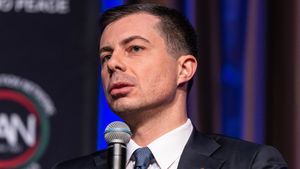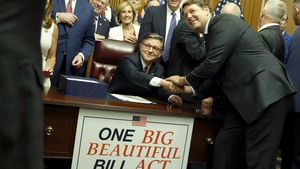Matt Smith has seen cocks of all shapes and sizes. To step into the shoes of famed photographer Robert Mapplethorpe, he had to, but he's quick to point out how compelling they've become to him. "That's what's clever about [Mapplethorpe]. You don't know why, but it's compelling even though it's just a penis," he explains as we sit down to talk the night after Mapplethorpe's Tribeca Film Festival debut.
The star, who previously played Prince Philip on The Crown and the titular Doctor Who, is as unrecognizable now in a hoodie and sporting facial hair as he was onscreen in an unsettlingly accurate take on Mapplethorpe. Filmed in just 19 days by documentarian Ondi Timoner, the biopic took on the tall task of compressing Mapplethorpe's life into 102-minute film -- with the weight of the portrayal squarely on Smith's broad shoulders.
Related | Mapplethorpe Debuts Crotch Shot Poster Ahead of Tribeca Film Festival Premiere
By all accounts, and luckily for everyone involved, it succeeds. From the first shot of him in the cramped quarters of a Pratt University room as he fled military life to the final moment of his life as he died of AIDS in a hospital bed and all the BDSM and anal fisting in between, Smith embodies the volatile -- and problematic -- spirit of one of America's most compelling photographers.
As he eased into his chair and reminisced about the whips and dicks he was surrounded by on set, we caught up with the actor to talk the delicate job of portraying AIDS on film, why straight actors should be able to take on gay roles, and the intrigue of leather culture.

OUT: Did you buy a harness after the movie finished?
Matt Smith: No, I probably should have. Just stick a whip up my ass.
Maybe not that far, buy a whip. Buy a harness.
Even that, something about the image. It's cool, isn't it? It's cool. I have a lot of straight friends and a lot of them find it quite hot. Then, the picture with the finger [in the hole of the penis]. You kind of go, 'Aaah!'
Yeah, and the fisting one, too.
Yeah! You can't help but return a glance. It's compelling.
Have you spent a lot of time looking at photographs of erect--
Cocks, yeah. When I first started with the photographs, I was like, 'Ugh, penises,' but actually, who knew that they're so compelling? There's something just right about it. That's what's clever about [Mapplethorpe]. You don't know why, but it's compelling even though it's just a penis.
There's a lot of nudity in the film, how did it feel to always been nude and be around...
Cocks? I know, I was like, 'what's happened to my life?'
Craziest 19 days of your life?
Yeah, up there. I've seen 'em before.

I feel like in America, people are more averse to nudity than people abroad.
Really?
Yeah, here it's a lot easier to have violence in a movie than--
Than nudity?
Yeah.
That's interesting. With that movie, when you're talking about Robert Mapplethorpe, you can't not have people being naked. You can't not see people having sex. It's hard to do well, sex. It's a difficult thing. It was just another day at the office for me. It's sort of weird, that kind of stuff, but then you get over it and you just fucking do it. The story required it so I just cracked on with it.
And you did a great job.
Thank you.
I think this might be your most intense role yet. How'd you prepare for it?
Like anything really, you immerse yourself as much as you can in the history, the context, the culture, the people, the photographs, the sex, the music. The politics of the time. Once you've soaked as much of that into yourself, you try and be impulsive.
Were you afraid of the challenge? You've played gay before, as Christopher Isherwood in Christopher and His Kind. Were you afraid of the challenge? People have become very critical of that.
Of straight actors playing gay? No. I don't agree with that idea at all -- that only gay people can play gay people. We're actors, and we are using our imaginations. With Robert [Mapplethorpe] and with Christopher [Isherwood], it was the artist and the writer that I'm interested in. I don't care if you're gay, straight, or whatever, if you're as good as Robert Mapplethorpe was at taking photographs, that's what I care about. Actually, in terms of the story, I think the gay part of the story was really interesting [in Mapplethorpe]. I was really intrigued by that leather culture.
He made these photos to be seen by everyone.
He made photos to provoke everyone, I think. I don't know. As actors, if you can only play yourself, what's the point? I'm more interested in the journey towards someone.

I'm glad they included all of those negative parts of him, because they could have just made a really nice--
It can't be that. He didn't give a fuck. He wanted to get a great picture and have loads of sex.
And he had sex even after he got AIDs.
I mean, it's crazy.
How challenging was it for you to portray him as he's dying of AIDS? By the end of it, I was really struck by how gaunt you looked.
That was the bit I was very worried about, because it's so hard to tell those stories well. And tell them sensitively. You look at movies that have done it well and movies that have done it badly, and I was very nervous. I don't know how I was, but it was part of the story. It's his story. I was nervous about it because it's a very singular journey -- you don't want to be remiss about it or treat it glibly. Or, for lack of better expression, to make it more dramatic because it's a really significant and serious condition.
I think you did it well.
Thank you very much, I really appreciate that. I was nervous. When you look at what actually happened at that time if you had AIDS and you were gay, [I can't] imagine how frightening it must have been to just not know what was going on and not have any information or support or any help.
One thing I was glad they included in the movie was his racism. It wasn't overt, but he did have a lot of tendencies towards racism. Was it hard to tackle that?
Yeah, of course. There are a lot of sensitive subjects. He was insensitive and he was selfish.
It was all about fame for him.
Yeah, and he was open about that. I respect that about him. He's like, 'Yeah bitch, I want to be famous. I want to be notorious. I want to be rich.' Weirdly, in this culture now, I think a lot of people want the same things but are more afraid to say it out loud.
Photos courtesy of the Tribeca Film Festival.









































































